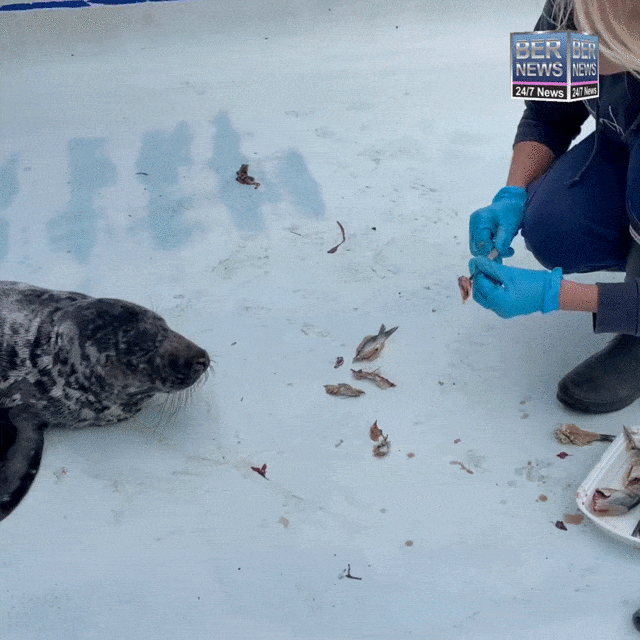Plans Being Made To Send Seal To The USA
The seal that was found in Bermuda last month — which is only a few weeks old — is “eating six pounds of fish a day, gaining weight, and generally doing well,” and plans are being made to send him to the Mystic Aquarium in Connecticut, with the same facility that accepted the seal that was found here in 2019, set to assist again.
BAMZ said they are “hopeful that his long journey will culminate with his return to the ocean,” noting that he cannot be safely released here as “Bermuda’s water is too warm and does not have adequate food sources to support him in the wild.”
This is according to the latest edition of Envirotalk, the quarterly newsletter of the Department of Environment and Natural Resources, with Roma Hayward, the Animal Care and Quarantine Officer of Bermuda Aquarium Museum and Zoo, writing: “Bermuda has had seals show up on its shores in the past but they are not regular visitors. We only have six recorded over the past 120 years.
“They are lost and have somehow gotten off course. When they reach us they are often dehydrated, emaciated, and suffering from heat exhaustion. We have seen harbour seals, monk seals, and grey seals.
“On February 18, 2023 the Bermuda Aquarium Museum and Zoo [BAMZ] was called mid-morning by a member of the public who had seen a seal pup on her morning walk at Clearwater beach. A picture and video were shared and BAMZ Curator, Patrick Talbot, was dispatched.
“The call came in a few hours after the sighting, so we were not too surprised to find that the seal was no longer there when we arrived. However, we received another call later in the afternoon detailing its new location and with aquarists quickly responding, we were able to corral the seal pup into a crate to be transported back to BAMZ.
“It was subsequently confirmed to be a male northeast grey seal about 5 weeks of age. The northeast grey seal has a cold temperate to subarctic distribution in North Atlantic waters over the continental shelf and range from Massachusetts up the east coast to Canada. Grey seals tend to wean their pups between 16-21 days of age. We suspected that this guy had recently been weaned and was making his way in the ocean, learning how to hunt fish on his own.
“Never knowing what infections or diseases a wild animal may be carrying when we initially receive them makes it imperative that we keep these animals, and the animal care staff working with them, separate from the rest of the animals in our care. There is always a risk of passing on contagions to other animals if the proper protocols and standards are not maintained.
“As with all other animals we receive in our rehabilitation program, there is a small team of staff dedicated to feeding and treating the seal while it is quarantined at BAMZ. This involves first teaching him how to eat fish and gradually increasing meal frequency to three feeds per day, regularly weighing him and collecting blood samples to make sure he is making good progress.
“Veterinarian and Curator Dr. Ian Walker and the animal care team at BAMZ has years of experience with marine animals and strandings. This little guy is in good hands, eating six pounds of fish a day, gaining weight, and generally doing well.
“Dr. Walker has reached out to our neighbours on the east coast of the U.S. to see if there would be anyone that could take the seal through the next stage of his recovery and later on to release him [Bermuda’s water is too warm and does not have adequate food sources to support him in the wild]. Mystic Aquarium graciously accepted that challenge again, as they had done in 2019 when we sent ‘Lou-Seal’ [another locally stranded grey seal] their way.
“BAMZ is grateful for the support from our local community in this venture and is hopeful that his long journey will culminate with his return to the ocean. We would like to thank our volunteers who have assisted with the seal feeds and tank cleaning, Laquita Minors from the Queen’s Club has provided several meals for the seal, CargoJet, and various government agencies have assisted in the process of getting this little seal back to where he belongs.
“This includes the US Consul General, United States Fish and Wildlife Service [USFWS] and the National Oceanic and Atmospheric Administration [NOAA]. We would like to remind people that if you come across a seal on a beach or shoreline to keep your distance. It is important to remember that even a resting seal is a wild animal.”
Read More About
Category: All, Environment, News




I hope it has a valid U.S.A passport.